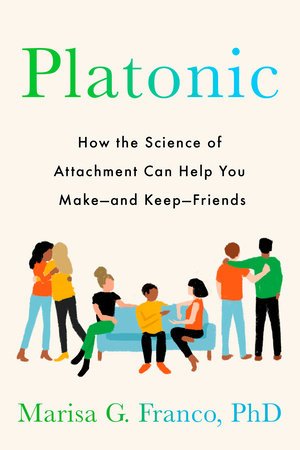Book Review: Platonic by Marisa Franco
Release Date: September 6, 2022
Platonic is intended to create a kinder, more loving, and friendlier world through sharing insights around how to make and keep friends. That’s definitely a noble aim, and there are some nuggets of wisdom sprinkled throughout. Unfortunately, the book’s heavy reliance on overly-detailed anecdotes made it a bit of a slog sometimes. Franco has some helpful and occasionally profound lessons to impart on the topic of friendship, but I can’t help but think these could have been better presented in a longform magazine article instead.
Franco clearly knows her stuff and is well-suited to tackle this subject. She is a practicing psychologist and former professor and her practice deals with friendship and the impact of social groups and communities on individuals. These experiences have provided her with a deep grasp of the various theories, research, and findings around friendship and many opportunities to practically apply them to real-world relationships. And Franco mines heavily from these counseling sessions in creating Platonic.
The central thesis of Platonic is that friendship and social connections are incredibly important to living healthy and fulfilling lives. I think extended Covid lockdowns have turned that argument into a bit of a straw man (at least for those who were living alone, those cooped up with their partner may have swung drastically in the other direction), but it was still interesting to learn about how exactly friendship enhances aspects of our life. Friendship evidently spurs a positive feedback loop where friendship helps us cultivate properties like empathy that make us better friends. And while romantic love garners way more attention from screenwriters and songwriters (and most people) than platonic love, a smattering of studies illustrates that platonic friendships can enhance those of the romantic variety by better regulating stress and conflict and making romantic partners more resilient. I thought those tidbits were pretty neat and did make me rethink how I value time with platonic friends.
Franco spends the first quarter of the book making her case for the value of platonic friendship, and then the remainder of Platonic is devoted to outlining how to become a better friend. She guides the reader through the major key principles of being a better friend (being vulnerable, generous, affectionate, etc. (but not too much!)) and hammers home the importance of taking initiative. The approach makes a ton of sense to me, and as someone who spent several years as a transplant in the climatologically and emotionally icy American upper Midwest I can safely say that all the friendship knowledge in the world isn’t going to help you if you don’t put yourself out there. She covers some of the most influential studies and theories on each subject (basing much of her friendship framework on attachment theory) and includes a ton of stories she encountered personally either from her social group or psychology practice. These stories are relevant to the principles she’s describing, but I felt that there were too many and the stories were too long. I’m not opposed to a few of these stories, and I know this is a common element of psychology books but this also isn’t a novel and it’s hard to get emotionally invested in the characters of these many anonymized stories. I would have appreciated greater descriptions of some of studies that were mostly explained at the surface level. Sure this study found X, but what what is the explanation for why that was the case? Maybe it’s the quant in me but getting a bit more in the psychology science “weeds” would have left me with a better understanding of friendship and help me better remember her concepts and recommendations. I was really dragging by the end of the book from an advanced case of uninteresting anecdote fatigue.
Platonic has its moments, and again, I can’t fault Franco for trying to make the world a friendlier place, but the book did leave me wanting more scientific heft and fewer anecdotes. I did pick up some interesting nuggets (I also found it fascinating/concerning that the increased popularity of homosexuality (which for the record is a good thing by me) has deterred men from developing especially close platonic male friends for fear of violating the “no homo” bro code, while super-close male relationships were more common back in the day when homosexuality was basically nonexistent) but I think the message could have been presented in a more compelling fashion.
5/10

